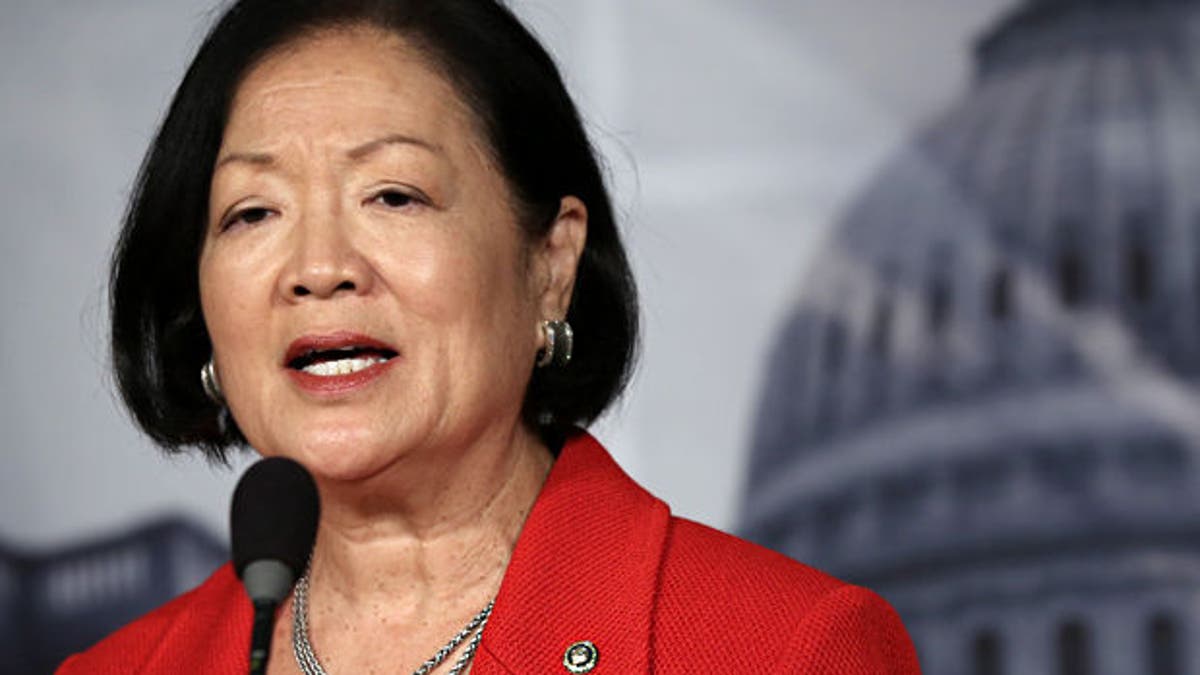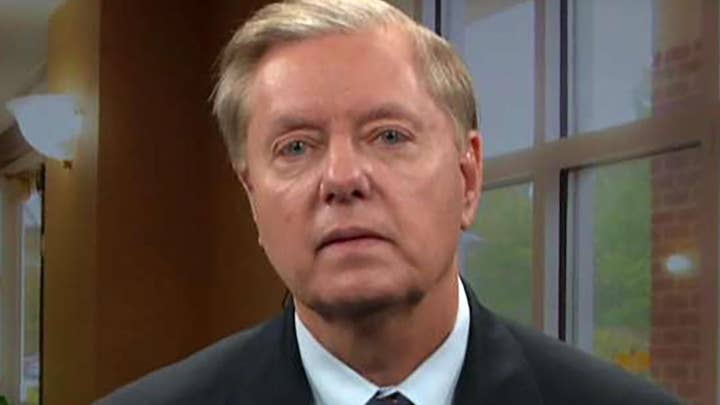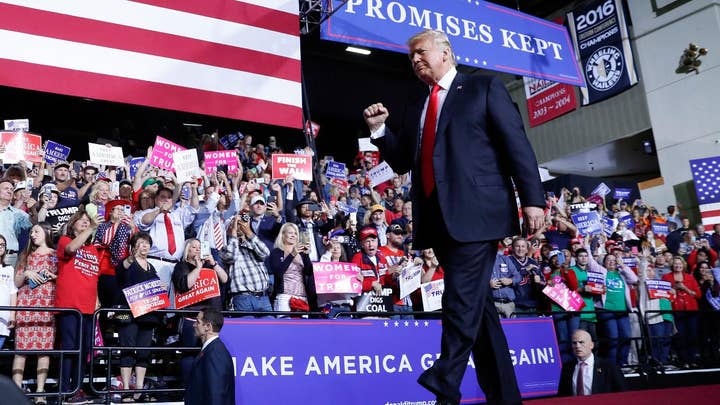
Sen. Mazie Hirono, who has emerged as one of the most vocal opponents of Supreme Court nominee Brett Kavanaugh, on Sunday didn't directly answer when asked if she was confident Democrats didn't strategically leak Christine Ford's accusations against him just days before a crucial Judiciary Committee vote.
Sen. Dianne Feinstein, D-Calif., received a letter from Ford in July outlining her claim that Kavanaugh had attacked her at a house party in the 1980s, and her office immediately recommended Ford retain a prominent liberal lawyer. But, as Sen. Lindsey Graham, R-S.C., and other top Republicans repeatedly noted last week, Feinstein failed to follow committee protocols and notify her colleagues or federal authorities, even on a confidential basis, about the accusations.
"Are you confident the Democrats didn’t leak that letter, and how do you respond to Senator Graham’s charge that it was inappropriate for the Democrats to refer Dr. Blasey Ford to a lawyer?" host George Stephanopoulos asked Hirono on ABC's "This Week."
"All of these things do not focus on what we should be focusing, which is the credibility of Judge Kavanaugh," Hirono, D-Hawaii, responded, before calling Kavanaugh's claims of a political conspiracy against him "bizarre."
HIRONO SAYS KAVANAUGH DOESN'T DESERVE DUE PROCESS BECAUSE HE'S CONSERVATIVE
"And, by the way, even as all of these accusations about this being politically motivated are being tossed around, everyone acknowledges, including Judge Kavanaugh, that Dr. Ford is not being politically motivated," Hirono, who has suggested Kavanaugh did not deserve due process because of his "outcome-driven" conservative legal philsophy, continued. "That is very clear."
The apparent non-answer likely would fuel Republicans' efforts to seek a deeper inquiry into exactly how news of Ford's confidential letter ended up in the hands of The Intercept -- a leak that GOP leaders, including Senate Majority Leader Mitch McConnell, R-Ky., have strongly suggested was orchestrated by Democrats.
"I'm going to get to the bottom of it," Graham told Fox News on Sunday, suggesting that someone in Feinstein's office or one of Ford's attorneys may have been responsible for strategically deploying the leak to harm Kavanaugh's chances. Graham also flatly said it was improper for Feinstein's office to recommend to Ford that she hire an attorney, especially one with connections to Feinstein and the Democratic Party.
In an explosive exchange during Thursday's hearing, Feinstein denied leaking the letter under questioning from Sens. Ted Cruz and John Cornyn, R-Texas. Feinstein then turned to her staff behind her, who also claimed they did not leak it, and suggested Ford's friends were behind the disclosure.
"Well, I'm telling you I did not," said Feinstein, who added: "It's my understanding that [Ford's] story was leaked before the letter became public and she testified that she had spoken to her friends about it, and it's most likely that that's how this story leaked ... But it did not leak from us, I assure you that."
Ryan Grim, the D.C. bureau chief at The Intercept who falsely implied on Twitter last week that Kavanaugh had received a legacy boost at Yale Law School because his grandfather attended Yale as an undergraduate, has denied that Feinstein leaked the letter to his publication.
Feinstein's handling of the letter has drawn the ire of top Republicans for weeks. In a scathing letter to Feinstein earlier this month, Judiciary Committee Chairman Chuck Grassley, R-Iowa, wrote that "I cannot overstate how disappointed I am" in the California Democrat's refusal to share Ford's allegation, saying her decision had ultimately compromised Ford's anonymity and unfairly stalled Kavanaugh's confirmation by politicizing a sexual assault claim.
Separately, Hirono also suggested that the unfolding FBI supplemental background check into Kavanaugh -- which Democrats had long demanded -- is shaping up to be a "farce," saying it should not be limited to seven days or limited to certain topics.
President Trump has insisted the FBI will have discretion to interview "whoever" it wants, and in response to Hirono's interview, Sen. Orrin Hatch, R-Utah, said the Hawaii senator was being predictable.
"The goalpost moving never stops," Hatch wrote on Sunday.
LINDSEY GRAHAM TEARS INTO DEMS DURING 'SHAM' HEARING
None of the witnesses that Ford, a California professor, has identified as being present at the party where she was allegedly assaulted -- including Leland Ingham Keyser, her best friend at the time -- have said they remember anything about the episode. Asked about Keyser's statement, Ford suggested on Thursday her friend was having medical issues.
In her testimony earlier in the day, Ford -- who had told Feinstein in her July letter that the party included "included me and 4 others" -- changed the tally, and told senators that there were four boys there, in addition to her female friend. In an August note Ford wrote in advance of a polygraph exam she took at the direction of her lawyers, she maintained that "there were 4 boys and a couple of girls" at the party, again apparently contradicting her letter to Feinstein in July.
Crucially, in Ford's Thursday testimony, she mentioned for the first time that she did not know the identity of one of the boys at the party, offering a possible last-minute explanation for why the other purported attendees were at a party relatively far from their own neighborhoods.
Ford has claimed that her therapist inaccurately recorded in 2012 that she had said four boys were in the room when she was attacked. Ford has also testified that the alleged attack occurred in 1982, after first telling The Washington Post it happened in the mid-1980s.
Additionally, Ford testified Thursday she had been unaware of committee Republicans' offers, which were communicated publicly and to her attorneys, to fly out to California to meet with her so that they could accomodate her reported fear of flying and expedite the confirmation process -- one of several discrepencies that Graham told Fox News on Sunday he wanted to probe.
In a memo released late Sunday, Rachel Mitchell, the sex-crimes prosecutor who questioned Ford on Thursday on behalf of Senate Republicans, outlined these and other apparent problems with Ford's credibility.














































